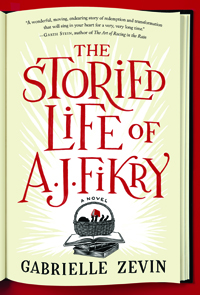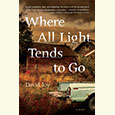A Love Letter to Books
In The Storied Life of A.J. Fikry, Gabrielle Zevin pays homage to readers

In her new novel, The Storied Life of A.J. Fikry, Gabrielle Zevin celebrates books and those who read them. Based loosely on the hero of George Eliot’s Silas Marner, that high-school standard, A.J. Fikry is a sad man. His wife has died, his bookstore is having a terrible year, and even his favorite sales rep is dead. All A.J. wants to do is make it through each day and drink himself to oblivion each night. On one of those nights, his one valuable belonging, a rare edition of Edgar Allan Poe’s Tamerlane, is stolen. What else can happen to the man? Anyone familiar with Eliot’s novel knows: a baby will be left in his store, and both A.J. and the island community of Alice will never be the same.
On her first visit to Island Books, sales rep Amelia Loman tries to interest A.J. in one of the new books on her list. The Late Bloomer is a memoir by an elderly man who fell in love late in life and then lost his wife to cancer. When A.J. cuts her off, she asks him to tell her what he likes to read. “How about I tell you what I don’t like?” he answers:
I do not like postmodernism, postapocalyptic settings, postmortem narrators, or magic realism. I rarely respond to supposedly clever formal devices, multiple fonts, pictures where they shouldn’t be—basically gimmicks of any kind. I find literary fiction about the Holocaust or any other major world tragedy to be distasteful—nonfiction only, please. I do not like genre mash-ups á la the literary detective novel or the literary fantasy. Literary should be literary, and genre should be genre, and crossbreeding rarely results in anything satisfying. I do not like children’s books, especially ones with orphans, and I prefer not to clutter my shelves with young adult. I do not like anything over four hundred pages or under one hundred fifty pages. I am repulsed by ghostwritten novels by reality television stars, celebrity picture books, sports memoirs, move tie-in editions, novelty items, and—I imagine this goes without saying—vampires. I rarely stock debuts, chick lit, poetry, or translations. I would prefer not to stock series, but the demands of my pocketbook require me to. For your part, you needn’t tell me about your “next big series” until it is ensconced on the New York Times Best Sellers list. Above all, Ms. Loman, I find slim literary volumes about little old men whose little old wives have died from cancer to be absolutely intolerable. No matter how well written the sales rep claims they are. No matter how many copies you promise I’ll sell on Mother’s Day.
Clearly A.J. Fikry is a man in sore need of redemption, and that redemption will of course come in the form of a baby, Maya, who has the power to bring A.J. back to the good things in the world: a pretty sales rep who just might forgive him his initial rudeness, a gentle police chief who can become a friend, and the wonder to be found in books.
 This is a novel that book lovers will find irresistible. The protagonist may be a curmudgeon and a bit of a snob, but his take on the literary world will have readers nodding their heads. A.J. loves books, for example, but rarely loves their authors: “He finds them to be unkempt, narcissistic, silly, and generally unpleasant people. He tries to avoid meeting the ones who’ve written books he loves for fear that will ruin their books for him.” Then there’s A.J.’s forays into the dating scene. When he asks his date about the last thing she’s read, she has to think for a moment before finally responding, “The last thing I read was this menu.”
This is a novel that book lovers will find irresistible. The protagonist may be a curmudgeon and a bit of a snob, but his take on the literary world will have readers nodding their heads. A.J. loves books, for example, but rarely loves their authors: “He finds them to be unkempt, narcissistic, silly, and generally unpleasant people. He tries to avoid meeting the ones who’ve written books he loves for fear that will ruin their books for him.” Then there’s A.J.’s forays into the dating scene. When he asks his date about the last thing she’s read, she has to think for a moment before finally responding, “The last thing I read was this menu.”
Reader, he does not marry her.
The Storied Life of A.J. Fikry is a book about books, a story about stories, and embedded within it are countless entertaining conversations about books. At one point Maya is telling Lambiase, the police chief, about From the Mixed-Up Files of Ms. Basil E. Frankweiler:
“They go to this big museum in New York City, and they hide out there. It’s—”
“It’s criminal is what it is,” Lambiase says. “It’s definitely trespassing. It’s probably breaking and entering too.”
“Lambiase,” Maya says, “you are missing the point.”
But this is not a novel without gravitas. Zevin does her Victorian source proud. Plot twists abound, and what seem to be random events turn out not to be so random after all. The humor is balanced with a fair share of darkness. There is deceit. There is death. But overall there is an endearing belief that love and literature will not only survive but triumph.

Faye Jones, dean of learning resources at Nashville State Community College, writes the Jolly Librarian blog for the college’s Mayfield Library. She earned her doctorate in nineteenth-century literature at Indiana University of Pennsylvania.


